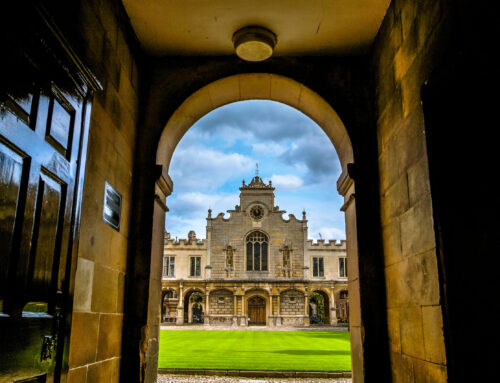In our A Level Alternatives series this week, we look at the International Baccalaureate Diploma Programme.
The IB continuum of programmes are designed to develop well-rounded individuals who can respond to today’s challenges with optimism and an open mind. Widely used in international schools, they are also steadily being adopted in the UK.

What is it?
The International Baccalaureate Diploma Programme (IBDP or just DP) was established in the mid-20th century to provide an international schools programme. The DP is managed by the International Baccalaureate Organisation, founded in 1968, which also runs a number of other qualifications for different age groups. Their website claims that the Diploma Programme “addresses the intellectual, social, emotional and physical well-being of students, and is respected by universities across the globe”.
The IBDP tries to develop research and analytical skills as well as simply testing knowledge retention, something that is often said to be a weakness of A levels. As a qualification designed for use around the world, it tries to encourage “an international outlook and intercultural skills, wherever appropriate”.
Today, there are over 5,000 partner schools which offer the IBDP, 95 of which are in the UK.
How does it work?
The IBDP is designed to give you a broad and rounded education across all aspects of academic study. As such, all students must study a course from each of 6 subject groups: Studies in Language and Literature, Language Acquisition, Individuals and Societies, Sciences, Mathematics, and the Arts.
Each of these subject courses can be taken at either Standard or Higher Level (SL and HL respectively). SL requires around 150 teaching hours, HL 240. The assessments are exactly the same, but if you choose HL, you are expected to show a greater understanding of the subject and a highly developed skillset. At least 3 of your courses must be taken at Higher Level.
Alongside the traditional subject papers, there are 3 smaller ‘core’ modules: Theory of Knowledge (TOK), Creativity, Activity and Service (CAS), and an Extended Essay (EE).
TOK is designed to get students to take a step back and think about knowledge itself: how do we know what is true and what is not, how do we assess the quality of evidence, and how can a theory impact the real world? EE is an independent research project culminating in a 4,000-word written report. The CAS aspect requires students to undertake a project involving creativity, physical activity and voluntary service, and although it does not earn UCAS points, it is claimed to be an important opportunity for self-reflection and development.
The DP is available in English, French and Spanish and is also expanding online, with the aim of providing a wider choice of courses alongside a flexible timetable for students and teachers.
What subjects can I study?
As mentioned above, you must study a paper from each of the 6 subject groups. There are anywhere between 4 and 10 options for each subject group. For example, within the Language Acquisition group, you might choose to study one of a number of modern or classical languages. The Individuals and Societies group allows you to choose between humanities subjects like history, philosophy and economics. The exact number of papers on offer will depend on the school you decide to study with, but in theory, you will be able to tailor your Diploma to explore your own interests or target a specific university course or career path with a complementary combination of paper choices.
How will I be assessed?
Both internal and external assessment are used to grade the DP. The majority of papers rely on written exams at the end of the programme, but coursework and oral assessments are also common, especially in TOK and EE.
Each subject group is graded from 1-7, with 7 being the highest grade. The Diploma is awarded to anyone who achieves a minimum of 24 points. TOK and EE are graded separately (from A to E) and may contribute up to 3 points towards your overall score. CAS does not earn any points, but you must complete it to finish the programme.
Higher Level and Standard Level courses are marked using the same criteria in terms of demonstrating skills and knowledge, and they receive the same number of Diploma points once they have been graded.
What is it worth?
The IBDP does not get awarded UCAS points as a whole, but the individual papers you sit will earn points. Although HL and SL papers are awarded the same grade when contributing towards your Diploma score, UCAS assign twice as many points to a HL paper than to a SL paper, with a top grade at HL being equivalent to an A* at A level.



The University Admissions Officers Report 2017, carried out by ACS and IBSCA, interviewed 81 university admissions officers and created a direct comparison between the IB Diploma and A levels. For a number of metrics, admissions officers scored IBDP higher than A levels, with respondents saying that the Diploma Programme is better for encouraging independent inquiry, developing workplace skills and developing an open mind. A levels, on the other hand, were rated better at developing in-depth subject knowledge.
When it comes to university admissions, the majority of institutions accept applications from students with an IB Diploma. However, different institutions have different views on how it compares with A levels. This means that there can be variations in offers between those which don’t use the UCAS tariff system. The mandatory Extended Essay can be used to show an ability to carry out research independently, a valuable study skill at university.
The IB Diploma is a largely academic qualification, so will be viewed similarly to A levels by employers if you choose not to go onto higher education. However, aspects of the programme will allow you to develop employability skills, such as during the voluntary community service part of CAS.
Conclusion
The International Baccalaureate may not be as popular as A levels or BTECs, but with the organisation now running for over 50 years, the Diploma Programme has a reputation for being of a high quality. In the UK, it seems to be restricted to a small number of (usually private) schools, but it is a worthy contender with A levels, especially for students who would prefer a rigorously academic qualification.
Ben’s work as a Project Editor focused on many aspects of Indigo, from research and content creation to helping draw up plans for the site’s next big developments. Ben joined the team in 2017 after a year as an English language assistant in France.





